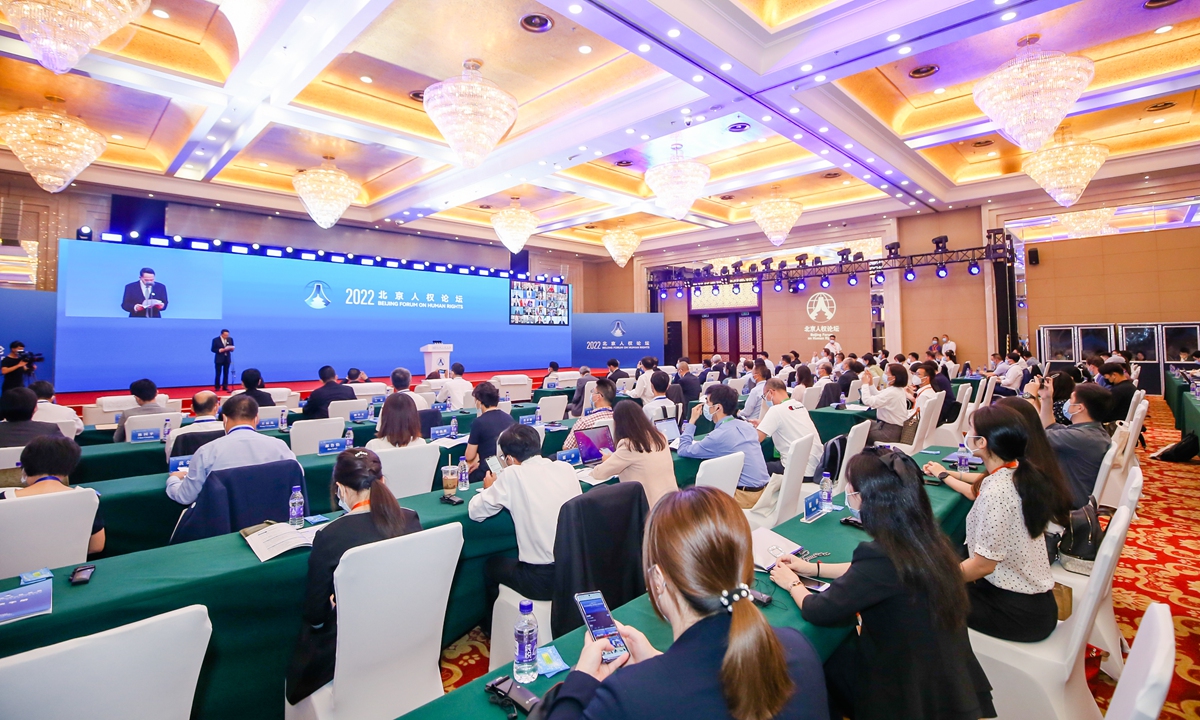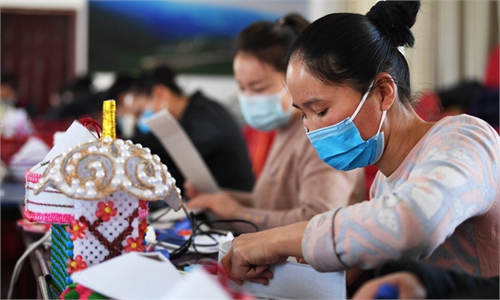China’s contribution to promoting global human rights hailed at Beijing forum; unilateralism, sanctions by West denounced as challenging global governance

Beijing Forum on Human Rights held at Beijing Conference Center on July 26. Photo: courtesy of China Society for Human Rights Studies
The Beijing Forum on Human Rights was held on Tuesday with about 200 attendees from nearly 70 countries around the globe and international organizations meeting to discuss issues that affect global human rights, including the COVID-19 pandemic, the Ukraine crisis, as well as the unilateral sanctions launched by the West which brought great concerns worldwide. Political leaders, scholars and representatives from the UN praised China's contribution to safeguarding and promoting human rights domestically and internationally.
Padma Choling, vice chairman of the Standing Committee of the National People's Congress (NPC) and president of China Society for Human Rights Studies, said at the opening ceremony that the world is entering a new period of turbulence and countries around the world need to work together to improve global governance for human rights and to have consensus on how to develop human rights.
Huang Mengfu, vice chairman of the 11th National Committee of the Chinese People's Political Consultative Conference (CPPCC) and chairman of the China Foundation for Human Rights Development, said that due to the unilateralism and power politics practiced by a few countries, the international order of human rights and the basis for better global governance are facing serious challenges.
Danilo Türk, former president of Slovenia, said via video link that "The need for global cooperation has never been as urgent as it is today. The cause of human rights will be served best when global cooperation is improved - and when the currently prevailing geopolitical and ideological tensions are reduced."
"Cooperation should be given precedence over competition and confrontation. This is not only a political and developmental requirement. This is also a requirement of human rights," he said.
Alena Douhan of Belarus, the UN Special Rapporteur on the Negative Impact of Unilateral Coercive Measures on the Enjoyment of Human Rights, raised concerns over the unilateral sanctions launched by the West.
"With great regret, I have to admit that unilateral coercive measures constitute today one of the most serious challenges to solidarity, universality, development and human rights protection," Douhan said.
"Every day we witness new unilateral sanctions being imposed over individuals, companies, sectors of the economy, the economy in general and individuals and companies cooperating with those who have already been designated or sought to become designated in future, or even those who might commit future acts not favored by sanctioning states," she said via video link.
President of China International Communications Group Du Zhanyuan said that security is the precondition for improving development and safeguarding human rights. "In recent years, regional conflicts, including the Ukraine crisis, are getting frequent, and this has caused serious food and energy crises," Du said, adding that the economic and sci-tech sanctions imposed by some countries have caused global inflation.
Economic and secondary sanctions enhanced by over-compliance result in growing unemployment, involvement in the gray economy, corruption, sexual exploitation and criminality, especially affecting those who are the most vulnerable and need better protection: the poorest, women, people living in the remote area and indigenous population, children and people suffering from chronical and severe disease, Douhan said.
"Human rights can only be protected and achieved if cooperation, dialogue, the rule of law and prohibition of discrimination and of double standards are applied by every state and every international organization as grounds for international relations," she noted.
She said "Unilateral sanctions shall still be viewed as a common and easy to use political tool. It's not at all of good guides against bad ones. A legality and humanitarian impact assessment shall be done before any measure is taken by any state used in precautionary approach."
Attendees praised China's contribution toward improving the human rights internally and globally. Tahir Farooq, editor-in-chief of the Daily Ittehad of Pakistan, said via video link that "Over the past four decades since the launch of reform and opening-up, China has lifted over 700 million people out of poverty, accounting for over 70 percent of poverty reduction worldwide."
"This makes China the largest contributor to the global effort of poverty eradication. China has created jobs for 770 million people, and has established the world's largest education, social insurance and primary-level democratic election systems," Farooq noted.
Bhofal Chambers, Speaker of the House of Representatives of Liberia, praised the efforts made by the Communist Party of China and the Chinese government to solve global human rights problems, including China's aid to help other countries promote women and children's rights, as well as UN peacekeeping missions. He said China is a great power to promote and safeguard global human rights.
The Beijing Forum on Human Rights has been held every year since 2008, attracting officials and human rights experts and scholars from countries and regions in the world. The forum provides a platform for current and former political leaders, diplomats, experts and scholars from China and abroad to review the history of the world's human rights development, to communicate with each other and lay the foundation for future cooperation.


